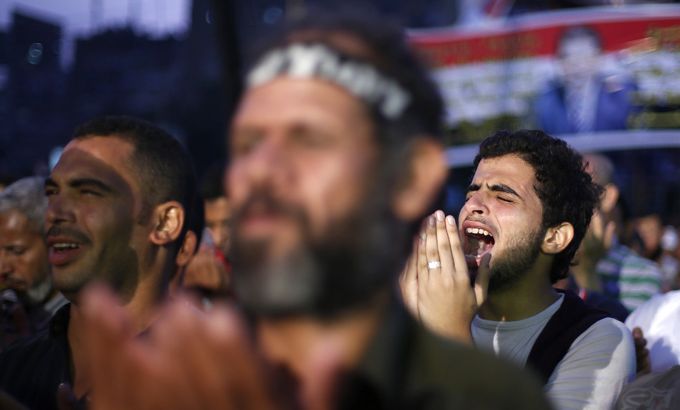Egypt killings prompt calls for restraint
The US, EU and Middle Eastern countries respond to the killing of at least 51 people in Cairo early Monday morning.

The United States and the European Union have condemned violence in Egypt and called for utmost restraint after the killing of dozens of supporters of the ousted president.
Washington called for Egypt’s military, which last week removed President Mohamed Morsi, to exercise “maximum restraint” after more than 50 Morsi loyalists were killed.
The Muslim Brotherhood, to which Morsi belongs, called for an “uprising” following the killings.
In Brussels, EU foreign policy chief Catherine Ashton warned all sides against “provocation or escalation” after the ‘ call for an uprising.
“All those who claim legitimacy must act in a responsible way for the good of the country and avoid any provocation or escalation of violence.”
Ashton “reiterates in the strongest possible terms her call for utmost restraint and an immediate end to the violence,” the spokesperson said.
The US is due to provide $1.3bn in military aid and $250m in economic aid to Egypt this year, almost all of which would be stopped if the administration formally deemed Morsi’s ouster a coup.
“I think it would not be in the best interests of the US to immediately change our assistance programmes to Egypt,” said White House Spokesman Jay Carney on Monday.
“We think, not just I, but we think that it would not be in the best interests of the US to do that. We are reviewing our obligations under the law and we will be consulting with Congress about the way forward, with regards to specifically the assistance package that we provide.”
Carney offered his condolences to the families of those who were killed in Cairo and called on the Egyptian military to use “maximum restraint” when dealing with protesters and urged leaders to work on creating a unified Egypt.
US Senator John McCain pressed on Monday for the US to suspend its $1.5bn in annual aid to Egypt, saying that Morsi’s removal from office appeared to be a coup led by the military.
McCain said he understood that Morsi’s removal was undertaken with broad public support and could eventually lead to a more representative civilian government.
|
|
| US White House spokesman Jay Carney says the Obama administration is concerned about what’s happening in Egypt. |
But as Washington debates how to respond to events in Egypt, he said in a statement that US law forbids foreign assistance to countries where there has been a military coup against an elected government.
“It is difficult for me to conclude that what happened was anything other than a coup in which the military played a decisive role,” said McCain, a senior member of the Senate Armed Services committee and a leading congressional voice.
An ‘end to the bloodshed’
Meanwhile, Turkey’s Foreign Minister Ahmet Davutoglu said he “strongly” condemned what he termed a “massacre”, expressing his country’s “solidarity with the Egyptian people”.
He called for a “normalisation” of the situation in Egypt, saying it was “the hope for the rising calls for democracy in the Middle East”.
Gaza’s Hamas rulers also described the killings as a “massacre” and expressed their “profound pain and sadness over the victims”.
In its statement, Hamas also called for “an end to the bloodshed among the Egyptian people”.
Qatar, a key backer of the Muslim Brotherhood, said it “strongly condemns such unfortunate acts that take away innocent lives”.
The emirate urged “self-restraint” and “national unity” as it urged “dialogue to preserve security, safety, and stability” in Egypt, according to a foreign ministry spokesman.
Germany also called for an independent investigation and urged all forces “to act with moderation and to renounce violence in all forms”.
“There is grave concern that there could be a further escalation of violence in Egypt,” the foreign ministry in Berlin said in a statement.
While not commenting directly on the recent violence, Iran slammed as “unacceptable and disturbing” the intervention of the army in political affairs.
“It cannot be denied that foreign hands are at work here,” said foreign ministry spokesman Abbas Araqchi, adding: “The polarisation of Egyptian society is dangerous.”